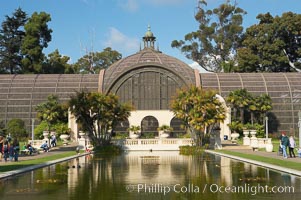
The Botanical Building in Balboa Park, San Diego. The Botanical Building, at 250 feet long by 75 feet wide and 60 feet tall, was the largest wood lath structure in the world when it was built in 1915 for the Panama-California Exposition. The Botanical Building, located on the Prado, west of the Museum of Art, contains about 2,100 permanent tropical plants along with changing seasonal flowers. The Lily Pond, just south of the Botanical Building, is an eloquent example of the use of reflecting pools to enhance architecture. The 193 by 43 foot pond and smaller companion pool were originally referred to as Las Lagunas de las Flores (The Lakes of the Flowers) and were designed as aquatic gardens. The pools contain exotic water lilies and lotus which bloom spring through fall. Balboa Park, San Diego.
Location: Balboa Park, San Diego, California
Image ID: 14576
Location: Balboa Park, San Diego, California
Image ID: 14576
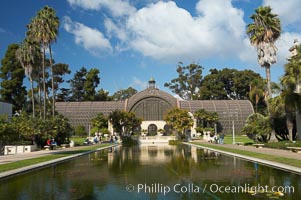
The Botanical Building in Balboa Park, San Diego. The Botanical Building, at 250 feet long by 75 feet wide and 60 feet tall, was the largest wood lath structure in the world when it was built in 1915 for the Panama-California Exposition. The Botanical Building, located on the Prado, west of the Museum of Art, contains about 2,100 permanent tropical plants along with changing seasonal flowers. The Lily Pond, just south of the Botanical Building, is an eloquent example of the use of reflecting pools to enhance architecture. The 193 by 43 foot pond and smaller companion pool were originally referred to as Las Lagunas de las Flores (The Lakes of the Flowers) and were designed as aquatic gardens. The pools contain exotic water lilies and lotus which bloom spring through fall. Balboa Park, San Diego.
Location: Balboa Park, San Diego, California
Image ID: 14577
Location: Balboa Park, San Diego, California
Image ID: 14577
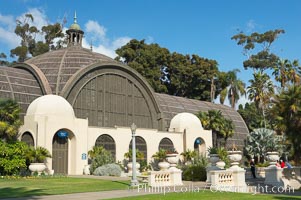
The Botanical Building in Balboa Park, San Diego. The Botanical Building, at 250 feet long by 75 feet wide and 60 feet tall, was the largest wood lath structure in the world when it was built in 1915 for the Panama-California Exposition. The Botanical Building, located on the Prado, west of the Museum of Art, contains about 2,100 permanent tropical plants along with changing seasonal flowers. The Lily Pond, just south of the Botanical Building, is an eloquent example of the use of reflecting pools to enhance architecture. The 193 by 43 foot pond and smaller companion pool were originally referred to as Las Lagunas de las Flores (The Lakes of the Flowers) and were designed as aquatic gardens. The pools contain exotic water lilies and lotus which bloom spring through fall. Balboa Park, San Diego.
Location: Balboa Park, San Diego, California
Image ID: 14579
Location: Balboa Park, San Diego, California
Image ID: 14579
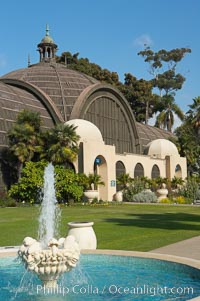
The Botanical Building in Balboa Park, San Diego. The Botanical Building, at 250 feet long by 75 feet wide and 60 feet tall, was the largest wood lath structure in the world when it was built in 1915 for the Panama-California Exposition. The Botanical Building, located on the Prado, west of the Museum of Art, contains about 2,100 permanent tropical plants along with changing seasonal flowers. The Lily Pond, just south of the Botanical Building, is an eloquent example of the use of reflecting pools to enhance architecture. The 193 by 43 foot pond and smaller companion pool were originally referred to as Las Lagunas de las Flores (The Lakes of the Flowers) and were designed as aquatic gardens. The pools contain exotic water lilies and lotus which bloom spring through fall. Balboa Park, San Diego.
Location: Balboa Park, San Diego, California
Image ID: 14580
Location: Balboa Park, San Diego, California
Image ID: 14580
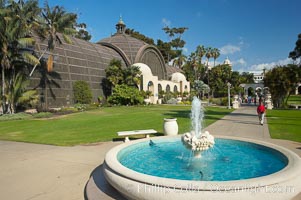
The Botanical Building in Balboa Park, San Diego. The Botanical Building, at 250 feet long by 75 feet wide and 60 feet tall, was the largest wood lath structure in the world when it was built in 1915 for the Panama-California Exposition. The Botanical Building, located on the Prado, west of the Museum of Art, contains about 2,100 permanent tropical plants along with changing seasonal flowers. The Lily Pond, just south of the Botanical Building, is an eloquent example of the use of reflecting pools to enhance architecture. The 193 by 43 foot pond and smaller companion pool were originally referred to as Las Lagunas de las Flores (The Lakes of the Flowers) and were designed as aquatic gardens. The pools contain exotic water lilies and lotus which bloom spring through fall. Balboa Park, San Diego.
Location: Balboa Park, San Diego, California
Image ID: 14581
Location: Balboa Park, San Diego, California
Image ID: 14581
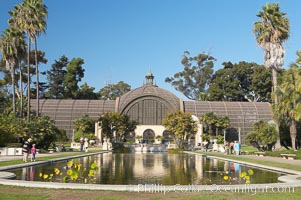
The Botanical Building in Balboa Park, San Diego. The Botanical Building, at 250 feet long by 75 feet wide and 60 feet tall, was the largest wood lath structure in the world when it was built in 1915 for the Panama-California Exposition. The Botanical Building, located on the Prado, west of the Museum of Art, contains about 2,100 permanent tropical plants along with changing seasonal flowers. The Lily Pond, just south of the Botanical Building, is an eloquent example of the use of reflecting pools to enhance architecture. The 193 by 43 foot pond and smaller companion pool were originally referred to as Las Lagunas de las Flores (The Lakes of the Flowers) and were designed as aquatic gardens. The pools contain exotic water lilies and lotus which bloom spring through fall. Balboa Park, San Diego.
Location: Balboa Park, San Diego, California
Image ID: 14583
Location: Balboa Park, San Diego, California
Image ID: 14583
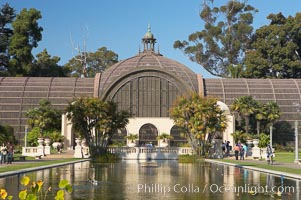
The Botanical Building in Balboa Park, San Diego. The Botanical Building, at 250 feet long by 75 feet wide and 60 feet tall, was the largest wood lath structure in the world when it was built in 1915 for the Panama-California Exposition. The Botanical Building, located on the Prado, west of the Museum of Art, contains about 2,100 permanent tropical plants along with changing seasonal flowers. The Lily Pond, just south of the Botanical Building, is an eloquent example of the use of reflecting pools to enhance architecture. The 193 by 43 foot pond and smaller companion pool were originally referred to as Las Lagunas de las Flores (The Lakes of the Flowers) and were designed as aquatic gardens. The pools contain exotic water lilies and lotus which bloom spring through fall. Balboa Park, San Diego.
Location: Balboa Park, San Diego, California
Image ID: 14584
Location: Balboa Park, San Diego, California
Image ID: 14584
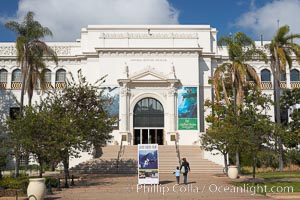
The San Diego Museum of Natural History, Balboa Park, San Diego. The San Diego Natural History Museum is the place to find dinosaur bones and get a close up look at insects, birds and organic matter that make our outside world so interesting. Renovated in 2001, a new wing has doubled the museums original 65,000 square feet of floor space to about 150,000 square feet.
Location: Balboa Park, San Diego, California
Image ID: 14585
Location: Balboa Park, San Diego, California
Image ID: 14585
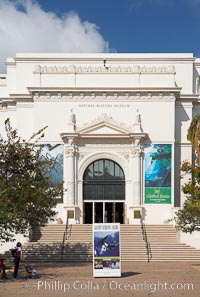
The San Diego Museum of Natural History, Balboa Park, San Diego. The San Diego Natural History Museum is the place to find dinosaur bones and get a close up look at insects, birds and organic matter that make our outside world so interesting. Renovated in 2001, a new wing has doubled the museums original 65,000 square feet of floor space to about 150,000 square feet.
Location: Balboa Park, San Diego, California
Image ID: 14586
Location: Balboa Park, San Diego, California
Image ID: 14586
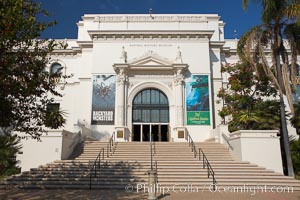
The San Diego Museum of Natural History, Balboa Park, San Diego. The San Diego Natural History Museum is the place to find dinosaur bones and get a close up look at insects, birds and organic matter that make our outside world so interesting. Renovated in 2001, a new wing has doubled the museums original 65,000 square feet of floor space to about 150,000 square feet.
Location: Balboa Park, San Diego, California
Image ID: 14587
Location: Balboa Park, San Diego, California
Image ID: 14587
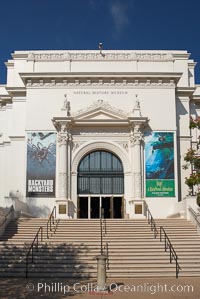
The San Diego Museum of Natural History, Balboa Park, San Diego. The San Diego Natural History Museum is the place to find dinosaur bones and get a close up look at insects, birds and organic matter that make our outside world so interesting. Renovated in 2001, a new wing has doubled the museums original 65,000 square feet of floor space to about 150,000 square feet.
Location: Balboa Park, San Diego, California
Image ID: 14588
Location: Balboa Park, San Diego, California
Image ID: 14588
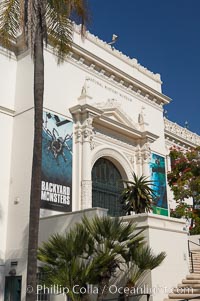
The San Diego Museum of Natural History, Balboa Park, San Diego. The San Diego Natural History Museum is the place to find dinosaur bones and get a close up look at insects, birds and organic matter that make our outside world so interesting. Renovated in 2001, a new wing has doubled the museums original 65,000 square feet of floor space to about 150,000 square feet.
Location: Balboa Park, San Diego, California
Image ID: 14589
Location: Balboa Park, San Diego, California
Image ID: 14589
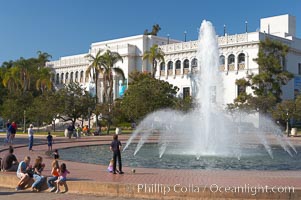
The Bea Evenson Foundation is the centerpiece of the Plaza de Balboa in Balboa Park, San Diego. The San Diego Natural History Museum is seen in the background.
Location: Balboa Park, San Diego, California
Image ID: 14590
Location: Balboa Park, San Diego, California
Image ID: 14590
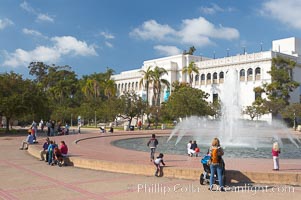
The Bea Evenson Foundation is the centerpiece of the Plaza de Balboa in Balboa Park, San Diego. The San Diego Natural History Museum is seen in the background.
Location: Balboa Park, San Diego, California
Image ID: 14591
Location: Balboa Park, San Diego, California
Image ID: 14591
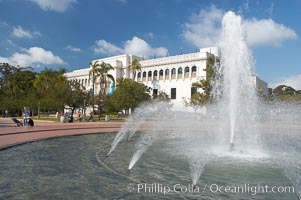
The Bea Evenson Foundation is the centerpiece of the Plaza de Balboa in Balboa Park, San Diego. The San Diego Natural History Museum is seen in the background.
Location: Balboa Park, San Diego, California
Image ID: 14592
Location: Balboa Park, San Diego, California
Image ID: 14592
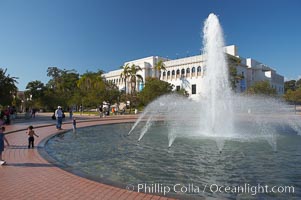
The Bea Evenson Foundation is the centerpiece of the Plaza de Balboa in Balboa Park, San Diego. The San Diego Natural History Museum is seen in the background.
Location: Balboa Park, San Diego, California
Image ID: 14593
Location: Balboa Park, San Diego, California
Image ID: 14593
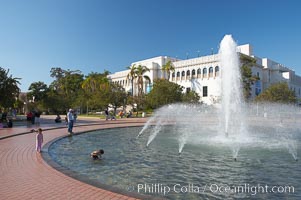
The Bea Evenson Foundation is the centerpiece of the Plaza de Balboa in Balboa Park, San Diego. The San Diego Natural History Museum is seen in the background.
Location: Balboa Park, San Diego, California
Image ID: 14594
Location: Balboa Park, San Diego, California
Image ID: 14594
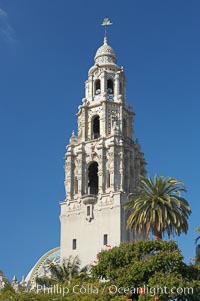
The California Tower rises 200 feet above Balboa Park.
Location: Balboa Park, San Diego, California
Image ID: 14595
Location: Balboa Park, San Diego, California
Image ID: 14595
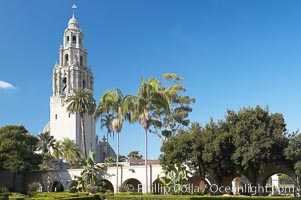
The California Tower rises 200 feet above Balboa Park.
Location: Balboa Park, San Diego, California
Image ID: 14596
Location: Balboa Park, San Diego, California
Image ID: 14596
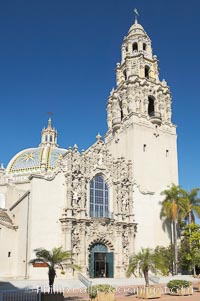
The San Diego Museum of Man in Balboa Park, also known as the California Building, is considered to be the most architecturally significant building in San Diego, and its construction beginning in 1915 introduced the Spanish Colonial-Revival style to Southern California.
Location: Balboa Park, San Diego, California
Image ID: 14597
Location: Balboa Park, San Diego, California
Image ID: 14597
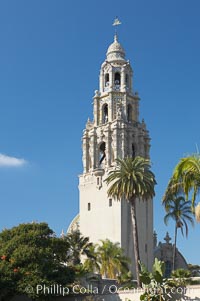
The California Tower rises 200 feet above Balboa Park.
Location: Balboa Park, San Diego, California
Image ID: 14598
Location: Balboa Park, San Diego, California
Image ID: 14598
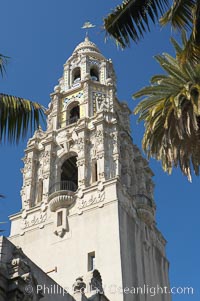
The California Tower rises 200 feet above Balboa Park.
Location: Balboa Park, San Diego, California
Image ID: 14599
Location: Balboa Park, San Diego, California
Image ID: 14599
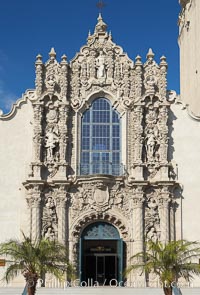
The San Diego Museum of Man in Balboa Park, also known as the California Building, is considered to be the most architecturally significant building in San Diego, and its construction beginning in 1915 introduced the Spanish Colonial-Revival style to Southern California.
Location: Balboa Park, San Diego, California
Image ID: 14600
Location: Balboa Park, San Diego, California
Image ID: 14600
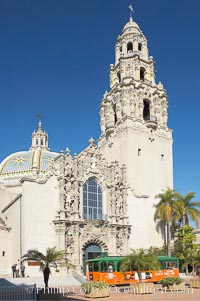
The South Facade of the San Diego Museum of Man is an ornate design containing statues and busts of figures important to the Spanish heritage of San Diego. Balboa Park.
Location: Balboa Park, San Diego, California
Image ID: 14601
Location: Balboa Park, San Diego, California
Image ID: 14601
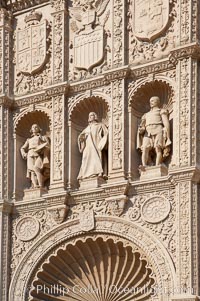
Detail of the facade of the San Diego Museum of Art depicting the 17th century Spanish Baroque painters Velazquez, Murillo and Zurbaran. Balboa Park.
Location: Balboa Park, San Diego, California
Image ID: 14602
Location: Balboa Park, San Diego, California
Image ID: 14602
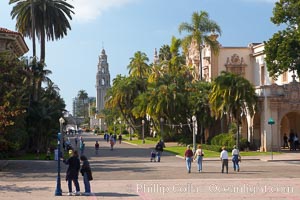
The Prado, or El Prado, the main east-west walkway through the heart of Balboa Park, is named for the Paseo del Prado in Madrid. Balboa Park.
Location: Balboa Park, San Diego, California
Image ID: 14603
Location: Balboa Park, San Diego, California
Image ID: 14603
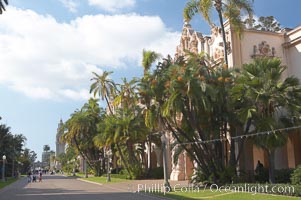
The Prado, or El Prado, the main east-west walkway through the heart of Balboa Park, is named for the Paseo del Prado in Madrid. Balboa Park.
Location: Balboa Park, San Diego, California
Image ID: 14604
Location: Balboa Park, San Diego, California
Image ID: 14604
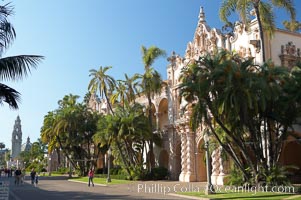
The Prado, or El Prado, the main east-west walkway through the heart of Balboa Park, is named for the Paseo del Prado in Madrid. Balboa Park.
Location: Balboa Park, San Diego, California
Image ID: 14605
Location: Balboa Park, San Diego, California
Image ID: 14605
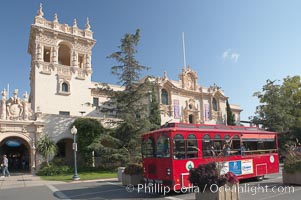
The House of Hospitality in Balboa Park, San Diego, and one of the free buses that shuttles tourists around the park.
Location: Balboa Park, San Diego, California
Image ID: 14606
Location: Balboa Park, San Diego, California
Image ID: 14606
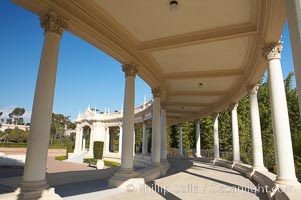
Columns and breezeway of the Spreckels Organ Pavilion in Balboa Park, San Diego. The Spreckels Organ is the largest musical instrument in the world. Built in 1915, it is played weekly during a free one-hour recital each Sunday.
Location: Balboa Park, San Diego, California
Image ID: 14607
Location: Balboa Park, San Diego, California
Image ID: 14607